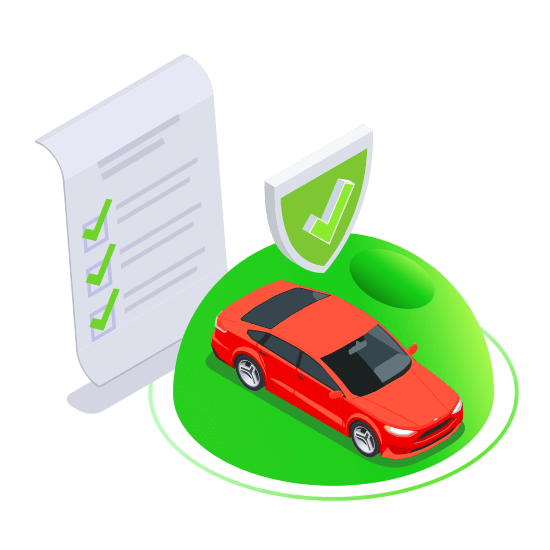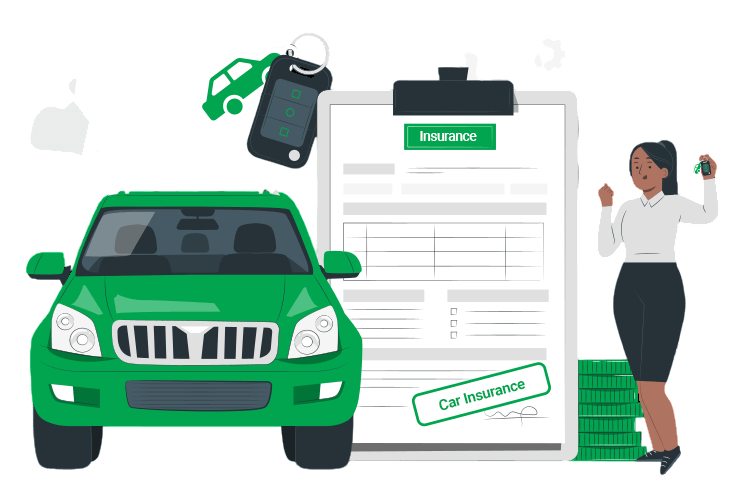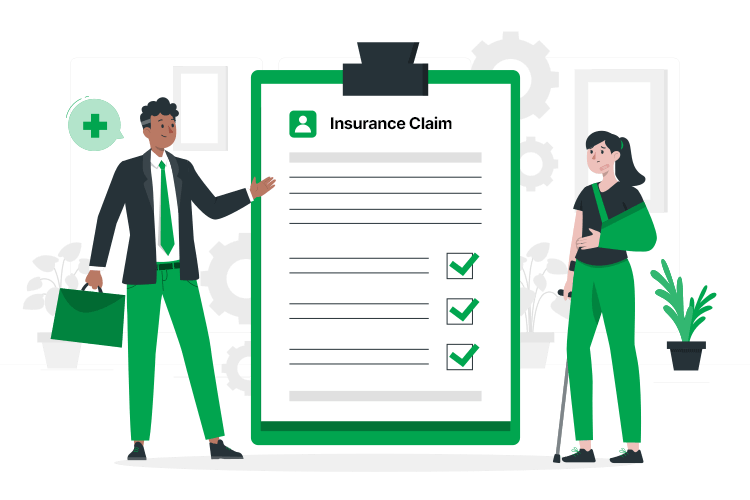
Please Wait transaction is in process, don't refresh page and do not press back button.

Car insurance is a legal agreement between a vehicle owner and an
insurance company that offers financial protection against a wide range of risks associated
with owning
and driving a car. This type of insurance is designed to provide coverage for expenses that
may arise
due to unexpected events, such as accidents, theft, natural disasters, or other unforeseen
incidents
involving the insured vehicle.
In exchange for paying a regular premium, the insurance
company
promises to compensate the policyholder for covered damages or losses, ensuring peace of
mind and
financial security.

Choosing the right car insurance plan depends on your requirements, driving habits, and budget. Here are different types of car insurance plans tailored to fit varying needs:
Third-Party Car Insurance is the most basic type of car insurance, and it's perfect for those looking for affordable coverage. This plan covers the costs associated with damage or injury caused to other people or property in an accident where you're at fault. However, it doesn't cover any damages to your own vehicle or injuries you might sustain. Many countries require this insurance by law, making it a great option for older cars or for drivers who want to meet legal requirements without spending too much.
Own Damage Car Insurance is a great choice if you're more focused on protecting your own car. This insurance covers the costs of repairs or replacements if your vehicle is damaged in an accident, stolen, or affected by natural disasters or vandalism. While it doesn't include third-party liability coverage, it ensures that your car is protected from various risks. It's ideal for those who want to safeguard their own vehicle without paying for third-party coverage they may not need.
Comprehensive Car Insurance is the all-inclusive option, offering the most complete coverage. With this plan, you're covered for both third-party liabilities and any damage to your own vehicle. Whether it's an accident, theft, fire, or even natural disasters, comprehensive insurance has you covered. You can also add extra protections like zero depreciation or roadside assistance to make the policy even more robust. This plan is perfect for new cars or high-value vehicles, offering peace of mind knowing that both you and others are fully protected on the road.
Car insurance policies come with several features designed to provide comprehensive protection for your vehicle and peace of mind for the policyholder. Here are the key features of a car insurance policy:
| Features | Description |
|---|---|
| Financial Coverage | Covers expenses related to vehicle damage, theft, natural disasters, or third-party liabilities. |
| Comprehensive and Third-Party Coverage | Offers protection against third-party liabilities and damages to your own vehicle. |
| Personal Accident Cover | Provides compensation for injury, permanent disability, or death of the insured driver/owner. |
| Easy Claims Process | Features online claim filing, quick settlements, and dedicated customer service for a hassle-free experience. |
| Insured Declared Value (IDV) | Maximum sum insured amount reflecting the current market value of the car, used for claims in case of total loss or theft. |
| Cashless Repair Services | Enables repairs at authorized network garages without upfront payments, as the insurer settles bills directly with the garage. |
| Add-On Covers | Includes options like zero depreciation, roadside assistance, engine protection, return to invoice, and key replacement for enhanced protection. |
| No Claim Bonus (NCB) | Rewards claim-free years with discounts on premiums, encouraging safe driving. |
| Protection Against Disasters | Covers damages caused by natural disasters (floods, earthquakes, etc.) and man-made risks (theft, riots, vandalism). |
| Customizable Coverage | Allows policyholders to tailor coverage by selecting additional riders or add-ons based on individual needs. |
| Coverage for Passengers | Extends personal accident protection to passengers in the insured vehicle. |
| Uninsured/Underinsured Motorist Coverage | Provides financial protection in accidents involving drivers with no or insufficient insurance coverage. |
| Legal Assistance | Covers legal fees and expenses arising from disputes or claims related to accidents. |
| Policy Portability | Allows transferring the policy to another insurer without losing benefits like the No Claim Bonus. |
| Policy Tenure Options | Offers flexible durations for policies, such as one-year, three-year, or long-term plans. |
| Premium Discounts | Provides discounts for installing anti-theft devices, bundling policies, or maintaining a clean driving record. |
Here are the key benefits of having car insurance:
Car insurance premiums can vary greatly from one driver to another, depending on several key factors. Insurance companies assess these factors to determine the level of risk they're taking on when insuring a vehicle. The goal is to predict the likelihood of a claim, which in turn influences how much you'll pay for coverage. By understanding what affects your premium, you can make more informed decisions and potentially find ways to reduce your costs:
The age of your car plays a significant role in determining your car insurance premium. Newer cars often come with higher premiums due to their higher replacement and repair costs. The cost of replacing parts or repairing damage can be significantly higher for a new vehicle. As the car ages, its value depreciates due to wear and tear, which typically lowers the premium. Insurers base their premium calculations on the car's current market value, so older cars with lower value are often cheaper to insure.
Where you live plays a significant role in determining your car insurance premium. If you're in an area with heavy traffic, higher accident rates, or more frequent vehicle theft, your premium is likely to be higher. Urban areas, with their dense traffic and greater risk of accidents or theft, tend to have higher premiums compared to rural locations, where there is less congestion and fewer claims. Insurers factor in the level of risk associated with your area when calculating your premium, so living in a busy city can impact your insurance costs more than living in a quieter, less populated area.
Your claims history is an important factor in determining your car insurance premium. If you have a history of frequent claims, such as multiple accidents or incidents, insurers may view you as a higher risk. This increases the likelihood of future claims, which can lead to a higher premium. Additionally, a poor claims history can affect your No Claim Bonus (NCB), a discount offered to drivers with a clean record. If you've made claims in the past, you may lose this bonus, causing your renewal premium to be higher. A good claims history can help keep your premium lower, while a history of claims can raise the cost of your coverage.
The IDV is essentially the current market value of your car. It represents the maximum amount you'll receive if your car is stolen or damaged beyond repair. The premium you pay for your car insurance is directly linked to the IDV. Comprehensive insurance policies include IDV, and the higher your IDV, the higher your premium will be. Essentially, a higher IDV means greater coverage but at a higher cost.
Add-ons allow you to enhance your Comprehensive Car Insurance Policy by providing extra coverage for specific needs, offering greater protection. Add-ons offer additional security, they also increase your premium. The more add-ons you choose, the higher the overall cost of your insurance. It's important to carefully consider the add-ons that suit your needs and budget, as while they provide added benefits, they can also raise the premium you pay.
The type of car you drive is one of the most important factors in determining your premium. Luxury, sports, and high-performance vehicles generally have higher premiums due to their higher repair or replacement costs. On the other hand, smaller, more economical vehicles often attract lower premiums as they are cheaper to repair and maintain.
Car insurance is essential for several reasons, as it provides financial protection, legal compliance, and peace of mind. Here's why you need car insurance:
A comprehensive car insurance policy also provides coverage for damages to your car caused by accidents, fires, natural disasters, man-made events, and more. The cost of repairing the vehicle is covered by your insurer. Additionally, if your car is declared a total loss, the insurer will reimburse you up to the Insured Declared Value (IDV), which is the maximum compensation amount for the loss of your vehicle.
Personal Accident Cover is a required add-on to your car insurance policy that provides financial support if you're injured or killed in an accident. This coverage helps protect you and your family from the unexpected consequences of a driving mishap, covering medical costs or providing compensation in case of death
A motor insurance policy safeguards against liabilities arising from accidents involving the insured vehicle. It includes coverage for third-party injuries, fatalities, and property damage. The final compensation amount for such claims is adjudicated by the Motor Accident Claims Tribunal (MACT).

When buying or renew car insurance, you will typically need to provide the following documents:

Here are some common Add-Ons for Car Insurance Policies:
A standard car insurance policy does not cover depreciation of the car and its parts. However, with the Zero Depreciation add-on, you are protected from depreciation costs, meaning you won't have to pay for the depreciation value of the vehicle's parts. The Nil Depreciation cover is subject to specific claims within the policy period and is available for cars up to 10 years old. Please note that compulsory and voluntary deductibles (as applicable) will still apply.
Engine Protection Cover is a valuable add-on for car owners who navigate through areas prone to floods, rough roads, or challenging terrains. This cover safeguards your car's engine from damages caused by issues like water entering the engine, oil leakage, or other non-accidental incidents that are often excluded from standard car insurance policies. Since engine repairs can be expensive, this add-on provides peace of mind by covering those costs, helping you avoid the financial strain that can come from engine-related damages. With this cover, your car's engine and vital.
This add-on helps you save on your car insurance premium even after making a claim during the policy year. With this cover, you can file a car insurance claim and still receive a discount of 20% to 50% on your car insurance renewal premium.
This add-on provides coverage for passengers in your car in the event of an unfortunate accident that leads to permanent disability or death. It offers financial protection for you and your loved ones by covering medical costs and providing compensation in the event of serious injuries or fatalities during an accident. Adding this cover can bring additional peace of mind, knowing that passengers are protected under your policy.
Here's a detailed comparison between Third-Party Car Insurance, Comprehensive Car Insurance, and Own Damage Insurance to help you understand their differences:
| Features | Third Party Insurance | Comprehensive Insurance | Own Damage Insurance |
|---|---|---|---|
| Coverage | Covers damages or injuries caused to others (third parties) by your vehicle. Does not cover your own vehicle. | Covers both third-party liabilities and damages to your own vehicle, including accidents, theft, fire, vandalism, and natural disasters. | Covers only damage to your own vehicle due to accidents, theft, vandalism, or natural disasters. |
| Car theft | Coverage does not include theft of the insured vehicle. | Partial or total losses arising out of the theft of the insured car are covered up to the vehicle's IDV. | This insurance covers damages resulting from accidents, collisions, theft, natural calamities, fire, etc |
| Premium | Coverage is subject to limits. | Higher coverage options are available, covering both third-party and own damages. | Lower than comprehensive insurance but higher than third-party insurance. |
| Add-Ons | This coverage cannot be customized with add-ons. | This coverage can be customized with add-ons like Zero Depreciation, NCB Protect, Consumables. | Customizable with add-ons like NCB Cover, Nil Depreciation, Tyre Protect, and more. |
| Damages to Third-Party Vehicle | This covers third party damage vehicle. | This covers third party damage vehicle. | It does not cover third party vehicle damage. |
Renewing your expired car insurance policy without delay is essential for several reasons
Driving without valid car insurance is illegal in many countries and can lead to fines, penalties, or even suspension of your driving license.
If you allow your policy to lapse, it may be harder and more expensive to renew it. Insurers may charge higher premiums or refuse to renew if there is a gap in coverage.
If your policy expires and you don't renew on time, you could lose the No Claim Bonus (NCB), which rewards you with a discount for not filing claims. This discount can significantly lower your premiums.
Delaying your renewal may result in higher premiums when you do renew. Insurers tend to increase rates if there is a gap in coverage or if you wait too long to renew.
Regularly renewing your car insurance ensures that your vehicle remains adequately protected from risks like accidents, theft, and third-party liabilities, giving you peace of mind.
When filing a car insurance claim, you typically need to provide the following documents:

Filing a car insurance claim can be a straightforward process if you follow the right steps. Here's a guide on how to claim your car insurance:
Inform your insurance company about the accident or damage as soon as possible.
Provide the insurer with details about the incident, including the time, place, and nature of the accident.
Insurance company may send a surveyor to inspect the vehicle before approving the claim.
Once your insurer verifies all details, they’ll approve the claim.
To reduce your car insurance premium, it's a good idea to avoid filing claims for minor car damages that are affordable to repair. Covering these expenses out of your own pocket allows you to maintain your No Claim Bonus (NCB). This bonus remains intact and gives you a significant discount on your premium during your next policy renewal, ultimately helping you save money in the long run.
Renewing your car insurance on time is crucial to avoid a policy lapse. If your policy expires, it can lead to higher renewal premiums and the loss of your No Claim Bonus (NCB), which otherwise helps reduce costs. To keep your four-wheeler insurance affordable, make sure you renew your policy before its expiration date.
Any modifications to your car, such as engine upgrades or custom accessories, can increase its value and, in turn, raise your insurance premiums. Modified vehicles are often considered higher risk and may attract higher premiums. To keep costs down, avoid unnecessary modifications. If you do modify your car, inform your insurer to ensure proper coverage.
It's important to carefully select add-on covers that match your vehicle's needs. This ensures you get the best coverage while potentially lowering your insurance premium. Consider add-ons like zero depreciation, roadside assistance, and engine protection for better protection and a smoother driving experience.
You can easily buy car insurance online by enter your vehicle details and compare available plans then select coverage and add-ons make secure online payment after successful payment you will receive the policy instantly via email.
Popular add-ons include:
Zero Depreciation Cover
Engine Protection Cover
Roadside Assistance
Return to Invoice Cover
Key Replacement Cover
Yes, comprehensive car insurance covers damage caused by floods, earthquakes, cyclones, storms, and other natural calamities.
You can renew your car insurance online by entering your vehicle number and policy details. Online renewal is quick, paperless, and ensures continuous coverage.
Yes. Third-party car insurance is mandatory under the Motor Vehicles Act. Driving without valid insurance can lead to heavy fines and legal penalties.